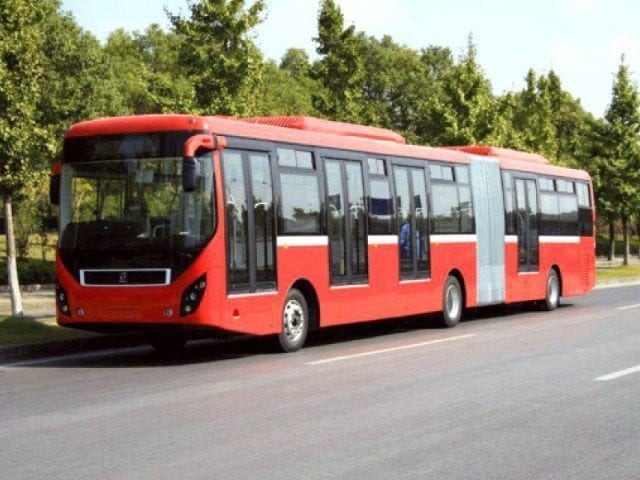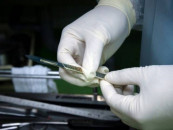Doing it the Punjabi way
Mirroring Lahore, Sindh govt to launch 600 new public buses in Karachi this year

Mirroring Lahore, Sindh govt to launch 600 new public buses in Karachi this year. PHOTO: ONLINE
Soon after the launch, Sindh Chief Minister Murad Ali Shah announced on March 30 a Rs2-billion subsidy for the transporters of Karachi to launch a fleet of 600 vehicles in the city to meet the growing requirement of passenger buses. What the Sindh government did not do is adopt is the financial model of the Punjab Mass-Transit Authority (PMA).
The Sindh government is offering five-year loans through Sindh Modarabad Management Limited (SMML) to transporters of the port city without going into the procurement process. The loans include a 30% down payment, according to Transport Secretary Tuaha Ahmed Farooqui, of which 15% will be paid by the transporter and the remainder by the government. The transporters will have to return the sum to the government after five years.
Metro bus subsidy: CDA asks government for Rs2.4 billion
The remaining 70% loan and mark-up will be paid by the transporter. Half of the mark-up will be paid to SMML and the full coverage 4% insurance rate to be paid to the Sindh Insurance Limited on the buses will also be subsidised.
The transporters, he said, can purchase buses from any manufacturers locally assembling vehicles and submit its invoice to SMML. "The same model can also be replicated with inter-city buses," said Farooqui, adding that in three months these buses will hit the city's roads.
For the bus routes, he said that the new buses could be plied on the old routes and new routes could be formed as per the demand of passengers.
Karachi Transport Ittehad's reservations
This model, however, does not sit well with the Karachi Transport Ittehad (KTI), who also had a meeting with the Sindh government recently regarding the induction of new buses. KTI Chairperson Irshad Bukhari told The Express Tribune that a 50-seat bus costs around Rs8.4 million and a 30-seater costs around Rs7 million.
After Metro Bus, new service to feed it
If the transporters go by the government's model, he said, they would have to pay around Rs110,000 in instalment per month for a 50-seat bus and around Rs80,000 for a 30-seat, for which the transporters should earn at least Rs170,000 per month. From this amount, the drivers and conductors' salaries could also be paid.
With the existing fares the Sindh government has imposed on them, Bukhari said they would not purchase any new buses. "There should be at least a Rs30 for the first 10 kilometres (km), Rs40 for 20km and Rs50 for beyond 20km rate per passenger," he said. "Or else there won't be any point for them to purchase any new buses."
A transport expert who has worked closely with the transport department said that if the operator of the bus failed to return money to the bank, the bus would be impounded and the same transport deficiency problem would arise. "A similar model was also presented in 2008 for CNG-run buses, for which several banks refused to give loans," the official said, adding that if the bus operator failed to earn double the amount he had to pay in instalments he would give the bus back to the bank.
Punjab's plan
The PMA had inked an agreement with Daewoo Pakistan in February 2016 for procurement, operation and maintenance of 200 feeder buses for integrated bus operations in Lahore. Daewoo has invested Rs3 billion in buying the buses, including 162 large and 38 small ones. The company will own and operate these buses on the feeder routes of the Lahore Metro Bus Service and bill the PMA on a kilometre basis. The authority will pay Rs165 and Rs140 per kilometre for large and small buses respectively.
‘Unfair’ fare of Metro feeder buses baffles citizens
The contract is of six years, and can be extended with mutual consent. The authority has plans to run 1,400 standard buses or minibuses on 104 routes with a route length of 951km. Passengers would have to purchase smart cards for Rs200, which have to be recharged monthly.
"The fare [of the feeder bus and metro bus] is integrated and is Rs15 per journey," said PMA General Manager Operations Syed Uzair Shah. He added that they have retained the responsibility of collecting the fare and the passenger does not have to pay a single penny to the bus operator. "There is a third company involved in the ticketing process," he explained, adding that PMA provides a subsidies of Rs1 billion per year and Rs130 million per month.
Feasible or fantastical?
An official of the Sindh Mass Transit Authority (SMTA), commenting on Punjab's financial model, said the Punjab government is paying a running subsidy, which is never sustainable. "What if some other political party wins in Punjab with an aim to invest in other sectors and refuses to pay such heavy subsidies monthly?" asked the official, explaining that one has to think realistically.
Student killed in Metro Bus accident in Pindi
Karachi's ridership, the official explained, is very different from that of Lahore. "There have to be three tiers of buses," he explained. "Metro buses, which would run on segregated lanes, feeder trips, which would transport passengers to metro bus stops, and buses on normal routes, which run on normal routes and could also be used as feeder buses," he said.
The best model could be that the Sindh government put buses on the road through its own financing rather than asking bus operators to buy buses on loan and hire operators on salaries to run those buses. "This way the hegemony of KTI would also end," the official reasoned.


















COMMENTS
Comments are moderated and generally will be posted if they are on-topic and not abusive.
For more information, please see our Comments FAQ